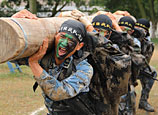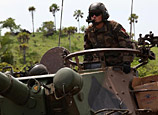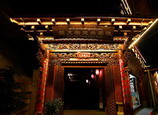
Ever since U.S. President Barack Obama proposed the high-keyed "return to the Asia-Pacific" at the end of 2011, the U.S. has begun to frequently organize joint military exercises in the Asia-Pacific region. For those exercises conducted in 2012 by the U.S. in the Western Pacific region alone, there were as many as 17 code names. Why is the U.S. so interested in Asia-Pacific region? Why does it frequently conduct such "exercises"?
In geostrategic sense, containing China in the Asia-Pacific region is the basic content of the U.S. policy toward China.
There are three major means for the U.S. to conduct deep involvement in the Asia-Pacific region: first, wide alliance to win over various countries in the Asia-Pacific region; second, military forward deployment to realize strategic "re-balancing"; and third, occupy a "leading" position in the region to play "pro-active role".
The U.S. believes that the time span from the end of the Cold War to 2015 is a period of "strategic opportunity", during which the rise and development of such major regional countries as China and Russia will pose serious challenges to the U.S. around 2015. Among the two, China "is more likely to become the challenger".
Therefore, the U. S. began to pay more attention to putting more pressure on China over Asia-Pacific issues.
In recent years, the U.S. has tried to increase its military presence in the Asia-Pacific region through the organization of a series of joint military exercises. Its constant strengthening of political and military intervention activities in the region has brought about significant impact on the security and stability of the Asia-Pacific region, and aggravated the contradictions and conflicts in interests among various parties in this region. As the result, a complex situation of interwoven competition and cooperation has begun to form in the region, which ushers in a new round of arms race, leading the region into a scenario of "warm economic relations with cold politics". This situation as well as the increasingly complicated new situations in the region should merit our close attention and high alert.
It is not difficult to see that the U.S. attempts to scramble the Asia-Pacific situation through joint military exercises, making full use of its military exercises as a kind of multilateral counterbalance against China, which is seeking more rights and interests in the Asia-Pacific region. It can thereby enhance its own influence on the Asia-Pacific region. This is perhaps the most ultimate intention of the U. S. In addition, the U.S. has chosen the Asia-Pacific region not only as a "trump card" to suppress the "regional hegemony" of China but also as an opportunity to demonstrate its strength and reshape its image as a superpower so as to fulfill its profound intentions.
By Zhen Zehao, associate professor of the National Defense University (NDU) of the Chinese People's Liberation Army (PLA)
















 Stand in face of bulldozer
Stand in face of bulldozer
With water and electricity cut, lonely 'Nail House' struggling to stay


![]()
